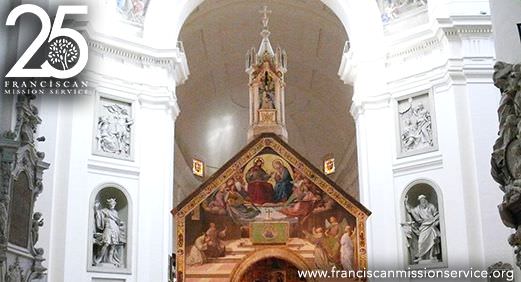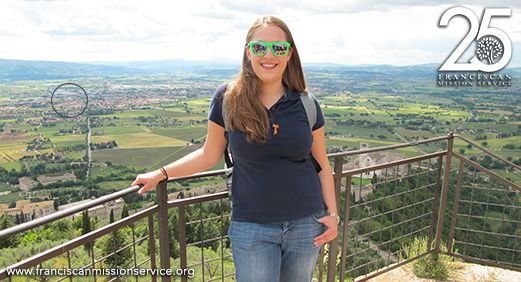Tapping into Potential at the Portiuncula

As the Feast of the Portiuncula approaches, I find myself reflecting on my own visit there this past May.
It was my fourth day in Assisi, and I finally felt like I was through the worst of the jet lag and fogginess that comes with it. The day before had been mostly spent in silent reflection, and I had begun to feel the peace that comes with a pilgrimage to this city that immediately feels like home to so many people.
Located in the valley below Assisi and originally a church dedicated to Mary as Our Lady of the Angels, the Portiuncula (or “Little Portion”) is where Franciscanism developed. It hosted many important events in Franciscan history, including the first major gatherings of friars, the moment St. Clare received her religious habit before starting her own community, and the death of St. Francis himself. The original Portiuncula is now located within a great basilica also called Our Lady of the Angels.
Our group was privileged to celebrate Mass within the small church within a church. With limited seating, several pilgrims sat on the floor and many others stood in the back or to the side. It was a moving experience, being in this simple chapel where St. Francis spent so much time. Touching the walls he touched. Walking through the same doorways in his footsteps.
What I find myself reflecting on most about this experience is part of the homily from that day: an alternate meaning of the word “virginal.” St. Francis greatly venerated the Virgin Mother, and when most Catholics hear the word “virgin,” they probably think of the meaning that is related to sex.
But the word “virgin” can imply other meanings as well. For instance, it’s often used to describe someone who has a lack of experience in a certain area. Someone doing something new for the first time, like a new hobby, might be said to be a “virgin” of it, similar to the concept of a ship’s “maiden voyage.”
Or, as was discussed in the homily that day, “virgin” can refer to untapped potential. Both St. Francis and St. Clare realized how much untapped potential was in their ordinary lives, and they embraced it with open arms, breaking out of societal conventions, and sowing a radical way of living out the Gospel.

Operations Manager Sarah Hoffeditz sporting her signature shades while on pilgrimage to Assisi. Santa Maria degli Angeli is in the background (in circle).
For the rest of the pilgrimage, I found myself reflecting on this idea of untapped potential. In what areas of my life was I not living up to my own potential, to God’s plans for me? What could I do to become the best, fullest version of myself? Because when we are the best, fullest versions of ourselves, we are most able to glorify God and serve our sisters and brothers.
On the August 2 feast of the Portiuncula, I invite you to reflect on the same things. Ask yourself: What is my untapped potential? What do I still need to do? To where and what is God calling me?
Featured image created by zyance via Wikicommons, public domain
Editor’s Note: Special thanks to Franciscan Pilgrimage Programs for making Sarah’s pilgrimage experience possible.
Tagged in:
